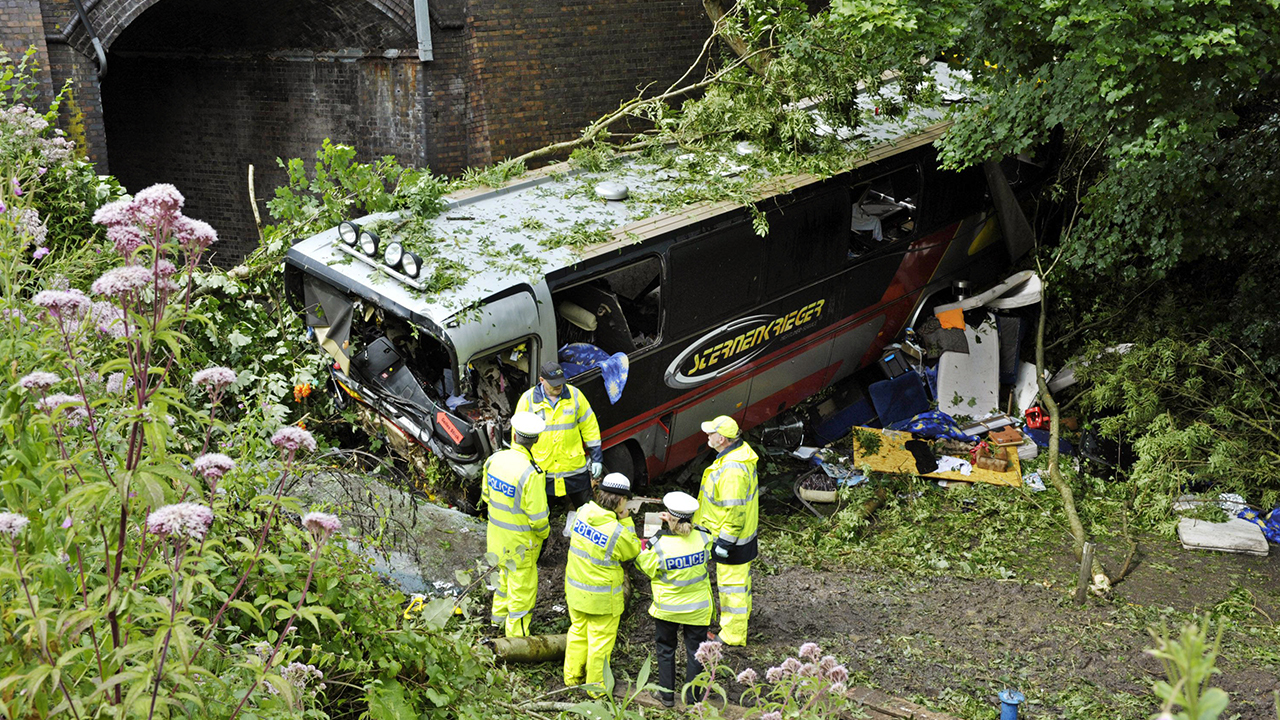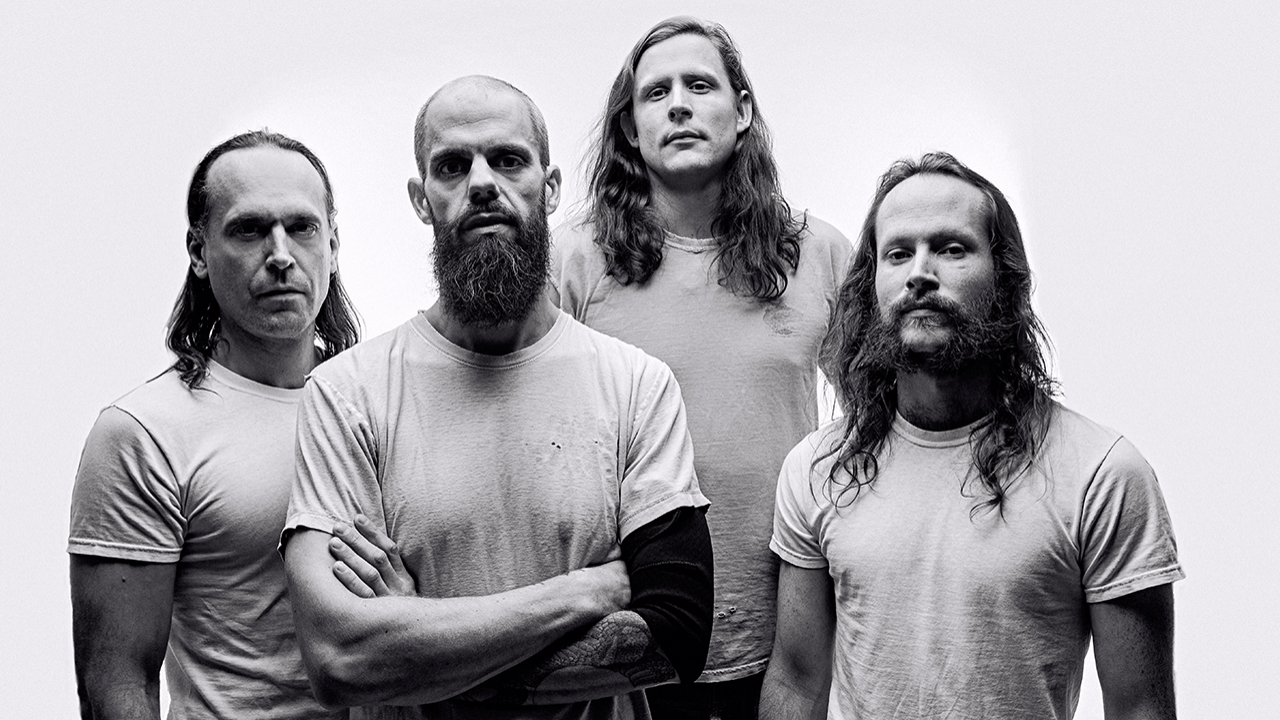As the Baroness tour bus smashed through the guard rail on Brassknocker Hill and plunged 30 feet into woodland below, the band’s frontman John Baizley locked eyes with driver Norman Markus and accepted that his fate was no longer within his control. Sitting at the front of the bus as it travelled from Bristol to Southampton, he’d heard the airbrakes fail on the steep incline outside Bath, heard the driver’s panicked swearing and knew the day would not end well.
The commotion caused guitarist Pete Adams to poke his head out of his bunk. He saw the terror on the faces of his bandmates and braced for impact. Adams had cheated death before, when as a US soldier serving in Iraq a grenade launcher exploded in his hands during a firefight outside Fallujah, blinding him in one eye. But this time he feared he might not be so lucky.
As the bus hit the ground, Baizley thumped into the windscreen. Covered in blood and broken glass, he knew his left leg was broken, and could see broken bone pushing against the skin of his left arm, which hung limp behind his back.
Adams was thrown from his bunk and amid the chaos, his first thought was to push their tour manager through a window to safety. As workmen from a nearby site rushed towards the wreckage, Adams saw Baizley slumped on the ground. Scattered in every direction were red, yellow, blue and green records, now splintered on the mud. As Adams comforted his friend, he considered that Baizley’s distinctive artwork had never looked more beautiful.

The events of August 15, 2012 propelled Baroness into the spotlight more than the three albums the Savannah, Georgia quartet had released up to then. A product of the same underground community which spawned Mastodon, the band were always more musically sophisticated than their peers, but remained a cult concern, for all the critical acclaim lavished upon 2007’s Red Album, 2009’s Blue Record and 2012’s Yellow & Green. That looks set to change, however, with the release of the powerfully emotive Purple, the debut on their own label, Abraxan Hymns, and easily their most accessible yet.
While the title alludes to the bruises they suffered in the accident and new songs offer reflections on its aftermath, Baizley and Adams are still wary of revisiting that morning. But sitting on a sofa in the Warner Music office, with whom they have partnered for the release of Purple, they meet inquiries with commendable grace.
“You’re in a room with two people who have looked death in the face and come back from the brink,” says Baizley quietly. “It leaves an imprint upon you that you can’t shake off. It gives you a mental fortitude in a way that no other experience can.”
The pair grew up together in Lexington, Virginia, bonding as teenagers over punk, metal and alternative rock. Their first musical adventures were conducted in the basement of Baizley’s parental home.
“In our small town they didn’t want the kids to have any fun,” says Adams. “We were angry kids, but we didn’t have anyone to yell at, so we made angry music instead.”
They made their live debut as Jab, before re-branding as Johnny Welfare and The Paychecks. While Baizley enrolled at art college and subsequently created artwork for Metallica, Kvelertak and a host of underground bands, Adams dropped out of school and joined a Richmond, Virginia street-punk band. When he reappeared in Lexington to tell friends that he’d enlisted in the military, they thought he was joking.
The events of September 11, 2001 ensured that the young soldier was sent first to Kuwait, and then Iraq, as part of the first wave of US military action against Saddam Hussein. In April 2003, he was one of the first US soldiers to enter Baghdad.
“Music wasn’t on my mind, survival was on my mind, because my life was on the line every waking minute,” he admits. “It’s a pretty dangerous job when the bullets start flying.”
Ironically, it was not enemy fire which laid Adams low, but a malfunctioning grenade launcher. Three months in hospital followed, before Adams was shipped back to Savannah. By then, Johnny Welfare and The Paychecks had reunited as Baroness. It would be five more years before Adams accepted Baizley’s invitation to join the band, by which time rave reviews for the Red Album acclaimed the quartet as one of the most exciting new bands in the US.
Their momentum was building steadily until the crash which literally turned their world upside down. All four band members were hospitalised and, seven months on, bassist Matt Maggioni and drummer Allen Blickle left the group.
“Some of the effects and injuries were severe enough to prohibit further activity in Baroness,” Baizley said at the time. He was having his own issues, admitting now to feeling “extremely traumatised”. In this dark hour, support came from a man who’d seen his own band’s future cast into turmoil by a bus crash in 1986.
“I don’t know how [Metallica frontman] James Hetfield located me, but his call meant so much,” says Baizley. “He said, ‘Look, this will be fine, just give it a little time’. To see there’s still some human kindness, even at the top of the music industry, was hugely inspiring.”
The end product of Baizley’s rehabilitation, Purple is a transcendent set of songs that elevates the band above their sludge-metal peers. Tell Baizley and Adams that is genuinely uplifting, and both men’s faces break into broad smiles.
“I was having a shitty time and then we’d write music and I’d be thrilled, so if that comes across, then great,” says Baizley. “Whatever happens now, we’ll never take this life, and this music, for granted. We use music to elevate ourselves and if we can speak to people in that universal language, that’s wonderful: that, to us, is success.”
Purple is out now on Abraxan Hymns.

